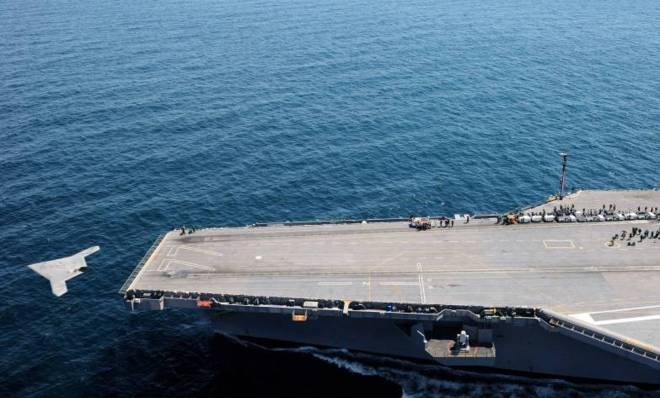Obama's military budget mistake


The USS George Washington, one of the Navy's 11 aircraft carriers, needs money for fuel. A gas card won't do. It takes several years to refuel an aircraft carrier, at a cost of more than $1 billion.
But the squeeze has real world consequences. Congress insists that the Navy keep 11 carriers afloat. Right now, budget forces are conspiring to kill at least one. And since the George Washington is supposed to begin its refueling cycle in 2016, the refueling costs are highly vulnerable to the budget cleaver.
The more the Navy delays the decision, the more expensive the refueling process becomes. (It takes more than a year to prepare for it. And this is the second time in as many years that a carrier has faced potential refueling delays, which quickly cascade.)
The Week
Escape your echo chamber. Get the facts behind the news, plus analysis from multiple perspectives.

Sign up for The Week's Free Newsletters
From our morning news briefing to a weekly Good News Newsletter, get the best of The Week delivered directly to your inbox.
From our morning news briefing to a weekly Good News Newsletter, get the best of The Week delivered directly to your inbox.
The Obama administration understands that credible deterrence requires a military that can respond to threats. On the simplest level, this means that the military's current assets must be ready to deploy when ordered. As of now, according to the admittedly self-interested commanders in chief of the armed forces, readiness (our ability to fight wars now) and modernization (our ability to fight wars in the future) are in direct competition. This is what they told Congress today.
Solving the readiness problems won't cost a fortune. It does not depart from the president's desire to cut the military budget over the long term. And the White House seems to realize this.
Obama's fiscal year 2015 budget, unveiled as Russia was invading the Crimean Peninsula, includes an extra $28 billion earmarked for priorities like readiness — and keeping the carrier fleet afloat certainly qualifies. But the budget process, as a series of scary emails I've gotten tonight from the Democratic Senatorial Campaign Committee remind me, is destined to produce a deadlock. It does not allow for immediate spending boosts to fix problems.
So here's the situation: Obama, many Democrats, and most Republicans, including virtually everyone who sits on the Armed Services committees, believes that a $28 billion boost to defense spending now is the right thing to do. But all agree that it stands little chance of happening.
A free daily email with the biggest news stories of the day – and the best features from TheWeek.com
This error is on Obama and his senior staff. The easiest thing to do, in this instance, would have been to ask Congress to pass a separate bill that contained the money. Natural political adversaries, like Rep. Buck McKeon (R), the outgoing chair of the Armed Services Committee in the House, would have been willing to fight for a clean bill so that his colleagues wouldn't try to attach poison pills related to ObamaCare or Iraq. Heck, McKeon might have even been willing to fight for a small tax increase to offset it. Yes, really.
But Obama did not reach out. Instead, the administration buried the money in its broader budget request, therefore subjecting it to the extreme pressures of the mandatory sequester caps imposed by the Budget Control Act and to the political locks associated with the Democratic and Republican parties.
He can still change his mind. And if Russia continues to be militarily aggressive, a one-time boost to U.S. military readiness would not be a bad message to send, and certainly would give Obama another tool to try and avoid actual conflict.
Marc Ambinder is TheWeek.com's editor-at-large. He is the author, with D.B. Grady, of The Command and Deep State: Inside the Government Secrecy Industry. Marc is also a contributing editor for The Atlantic and GQ. Formerly, he served as White House correspondent for National Journal, chief political consultant for CBS News, and politics editor at The Atlantic. Marc is a 2001 graduate of Harvard. He is married to Michael Park, a corporate strategy consultant, and lives in Los Angeles.
-
 Gavin Newsom and Dr. Oz feud over fraud allegations
Gavin Newsom and Dr. Oz feud over fraud allegationsIn the Spotlight Newsom called Oz’s behavior ‘baseless and racist’
-
 ‘Admin night’: the TikTok trend turning paperwork into a party
‘Admin night’: the TikTok trend turning paperwork into a partyThe Explainer Grab your friends and make a night of tackling the most boring tasks
-
 Find art, beautiful parks and bright pink soup in Vilnius
Find art, beautiful parks and bright pink soup in VilniusThe Week Recommends The city offers the best of a European capital
-
 The recycling crisis
The recycling crisisThe Explainer Much of the stuff Americans think they are "recycling" now ends up in landfills and incinerators. Why?
-
 The L.A. teachers strike, explained
The L.A. teachers strike, explainedThe Explainer Everything you need to know about the education crisis roiling the Los Angeles Unified School District
-
 The NSA knew about cellphone surveillance around the White House 6 years ago
The NSA knew about cellphone surveillance around the White House 6 years agoThe Explainer Here's what they did about it
-
 America's homelessness crisis
America's homelessness crisisThe Explainer The number of homeless people in the U.S. is rising for the first time in years. What’s behind the increase?
-
 The truth about America's illegal immigrants
The truth about America's illegal immigrantsThe Explainer America's illegal immigration controversy, explained
-
 Chicago in crisis
Chicago in crisisThe Explainer The "City of the Big Shoulders" is buckling under the weight of major racial, political, and economic burdens. Here's everything you need to know.
-
 The bad news about ISIS's defeat in Ramadi
The bad news about ISIS's defeat in RamadiThe Explainer The contours of a broader sectarian war are coming into focus
-
 America can still destroy the world
America can still destroy the worldThe Explainer The decline of U.S. military power has been greatly exaggerated
